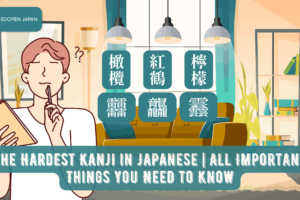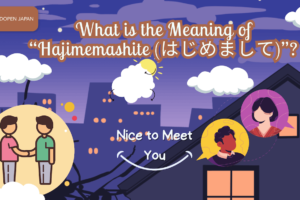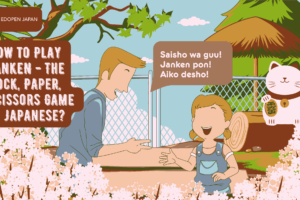お疲れ様 (Otsukaresama) is one of those words that everyone who has been in contact with Japanese media has heard at least once. It is considered one of the most recognizable Japanese words. And even some localizations of Japanese anime, manga or drama leave the word as it is.
Instead of translating it, in this article we would like to take a closer look at the meaning of Otsukaresama, its history, usage, and examples. And even some different alternatives or words that have a similar context or use to Otsukaresama. Let’s learn more about this phrase, which is very common and often used in various activities at school, in the office, and in public places.
In addition, if you are currently learning and exploring Japanese and vocabulary that is often used in other everyday Japanese conversations, please also read our recommended reading below:
Read also:
How to Use “Yoroshiku Onegaishimasu”?
Japanese Honorifics: San, Chan, Kun, and Other
What is the Meaning of “Hajimemashite (はじめまして)”?
Contents
The meaning of “お疲れさま (Otsukaresama)”
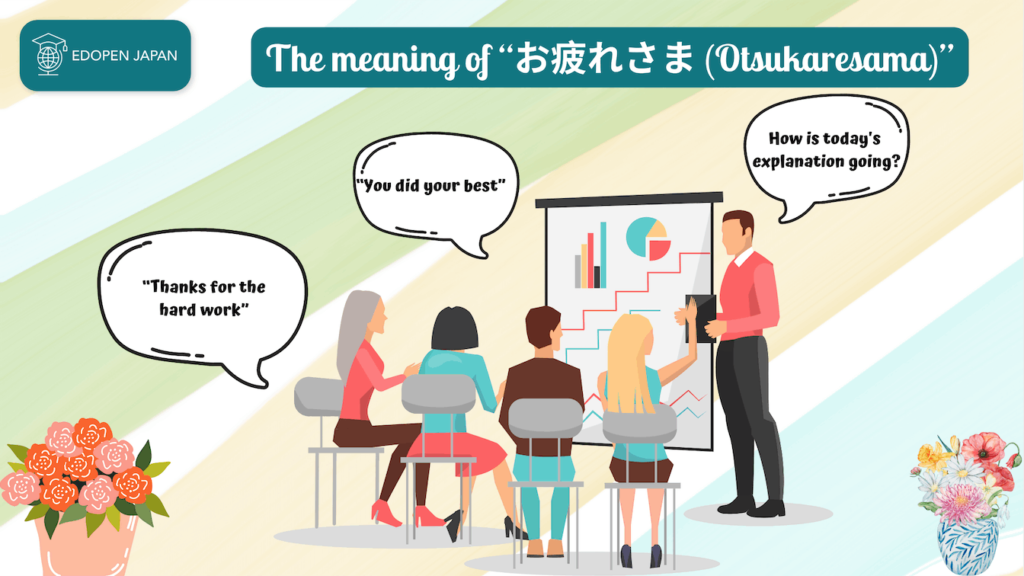
First, look at how Otsukaresama is translated in different media. It has been translated as “Thanks for your hard work,” “You did your best,” “This is the end for today,” “See you tomorrow,” or even “Goodbye.
But why is it that Otsukaresama doesn’t have a concrete enough translation to remain consistent among all media? The reason is that Otsukaresama doesn’t have a direct translation into English, or other languages for that matter.
General meaning of “お疲れさま (Otsukaresama)”
In order to easily explain what Otsukaresama is, the first thing to say is that Otsukaresama is not a phrase by itself, but a single word. So in Japanese, in its formal form, it would be お疲れさまです (Otsukaresama Desu). This would be the most common way to structure this word when heard in a formal situation such as an office, school, or event.
Otsukaresama by itself is a noun without a specific meaning, but an idea. Otsukaresama is a greeting used when acknowledging or designating the work done by the person to whom the greeting is addressed.
The history of the term “お疲れさま (Otsukaresama)”.
It is not entirely clear where Otsukaresama came from. But one of the most accepted origins of the word is that of ancient times.
It was not お疲れ様 (Otsukaresama) but, お憑かれ様 (Otsukare-Sama). Although it has the same in pronunciation, the meaning is completely different.
With details meaning of the kanji of “otsukaresama” is as follows:
| Present Kanji (お疲れ様) | Old Kanji (お憑かれ様) |
| 疲 Means being tired or low on energy. | 憑 Means a possession. |
While the kanji used in modern times, 疲, conveys the meaning of being tired or lacking energy, the other, much more complex and unusual to find in this age, 憑, conveys the meaning of being possessed, as if possessed by a ghost. This other word, お憑かれ様, has the meaning that something or someone possessed the recipient’s body, and in fact, the 様 should convey respect for the spirit that took over the person’s body.
It is easy to see that it has a rather negative meaning, like saying someone is possessed when they are tired. This is because at that time priests and the folklore of the Japanese people indicated that if someone was sick or tired, it was because he was possessed by a spirit.
Because of this spirit, after a long day’s work, the workers’ spirits would lose their strength and make it easier for external spirits to take over their bodies or stay near them, making them feel tired and without energy.
Then, simply by the passage of time, the beliefs and ideas began to change until it became the feeling that also conveyed the symptoms of fatigue 疲 instead of the possession 憑 that was formally used.
Another Origin of “お疲れさま (Otsukaresama)”
Another probable origin for the expression Otsukaresama is said to be that around the area of Azuchi or the Edo period, it was common for people to work in restaurants and places frequented by workers after a day of work as お疲れさん (Otsukare-San) “tired person” as they would look like such, a tired person after a long day of, at that time, manual labor.
Why? Because whenever they would approach one of these places, the people at the stalls, or even the workers’ wives themselves, would say something like まもなくお疲れさんたちが来ます。 (mamonaku Otukare- san tachi ga kimasu) san tachi ga kimasu) “The Otsukare-sans are coming soon” to indicate that the sun was about to set and the workers would be on their way back to their homes.
Then, over time, it changed from さん (San) to 様 (Sama), and from signaling a person or group of people, it began to address the act of getting tired from work.
How to use “お疲れさま (Otsukaresama)”
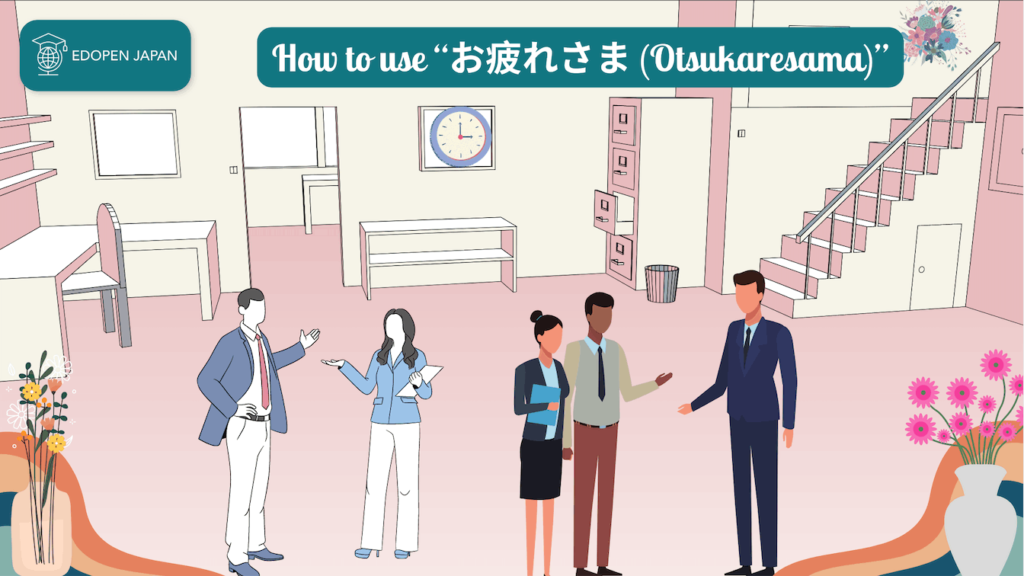
When applied to a work environment, it is usually directed at a partner who is returning before you or at the same time. In this case, the first phrase would come from the one leaving first, which is usually お先に失礼します′(Osakini Shitureishimasu).
This would be translated as “I will say goodbye first. This means that someone else will stay. Then the one who is staying should respond with お疲れ様です‖ (Otsukaresama Desu) with the intention of offering a greeting more formal than Sayounara, Mata kondo, or a similar farewell greeting.
In addition to the most common use of the word, it is a fact that in recent times, Otsukaresama has become a substitute for other greetings, including おはようございます (Ohayou Gozaimasu) こんにちは (Konnnichiwa).
This is especially common among high school and university students. It is just another greeting that can be used regardless of the context or whether or not there has been any work. One should say that if you were to cross paths with a friend, one of the words you could say would be Otsukaresama.
Also, it is more common to use お疲れー (Otsukare-), as it is a simple reduction of the original, giving it a more familiar and intimate feeling to the recipient. This is also important to note that it is not a good idea to start using お疲れ様 with everyone around you, it is considered a bit rude, especially by the older generation, to address your teachers and mentors with Otsukaresama.
In addition, when a teacher or mentor addresses you with Otsukaresama at the end of a lesson or the like, you should return it, not with the same Otsukaresama, but with a ありがとうございました ( Arigatougozaimashita), because you should instead show your gratitude and appreciation to the teacher by sharing his or her knowledge with you.
The Cultural Perspective on “お疲れさま (Otsukaresama)
One of the interesting things about Otsukaresama is that there are quite controversial opinions about how and to whom it can be addressed. And even this opinion changes a lot depending on the age of the sender and the recipient. While people of older age think that you shouldn’t use Otsukaresama on someone above you at all.
Furthermore, Otsukaresama is used together with a more standardized alternative ご苦労様 (Gokurou-sama). Right now, if you were to ask a Japanese university student, he would say that for a teacher close to his age, let’s say 25~40 years old, he would be inclined to say お疲れさまでした to his teachers, while if the teacher is over 50 years old, he would surely use ありがとうございました。 or ご苦労様でした to show more respect to him.
Additional trivia about ご苦労様 (Gokurou-sama)
More Interesting Facts About ご苦労様aIt’s interesting to note that it’s only recently that it’s considered polite to use ご苦労様 to show respect to a teacher, because in the past, ご苦労様 was considered a word that only superiors would use with the people under their charge, such as a teacher with his students or a boss with his subordinates.
This change has only occurred in the academic world, because in the office, ご苦労様 is still considered a word that only people of higher rank should use to refer to those below them, and お疲れ様 is considered a word that someone of lower rank should use in response. But with how much ご苦労様 has appeared in this article, one would wonder what this world and its formality are conveying.
Learn about “ご苦労様 (Gokurousama)”

ご苦労様 (Gokurousama) is a word that would be translated with exactly the same similar words presented at the beginning of this article for お疲れ様, words like “Thanks for your hard work” or “Have a good rest”, “I appreciate your efforts”, but it has a different nuance than Otsukaresama, ご苦労 by itself translates to “The trouble I put you through,” and it is believed that the 様 of it is used to refer to the person to whom it is directed.
One of the most accurate translations would be “The person I made to go through trouble,” so in fact, as you can see, it has a certain sense of authority from the one who uses it to the one who receives it. But at the same time it has an apologetic feeling, because it means that what you asked them to do was something that they had to do because of you.
Therefore, it is based on the importance of the nuance of this word. It has a wide range of uses depending on the generation of each of its users, for example, younger people consider this phrase a good way to express gratitude to an older teacher who taught them directly. An example is a thesis supervisor or a sports coach.
Is Gokurousama (ご苦労様) rude?
But in fact, some older people consider it rude, as it signals that you were the one that made them do it, reducing the feeling of authority from the one receiving it. This is why, it is not recommended to use it to refer to your boss or someone who has direct authority over you, as it might infer that you have a slight feeling of superiority over them.
It is also a bit more rigid than Otsukaresama so when shortened, the only thing that gets shortened or changed to a feeling of familiarity would be the 様 (Sama) of this phrase to さん (San) as well as just losing it altogether and becoming the simple word ご苦労 (Gokurou) instead of while still conveying the greeting.
The variants of the expression “お疲れさま (Otsukaresama)”
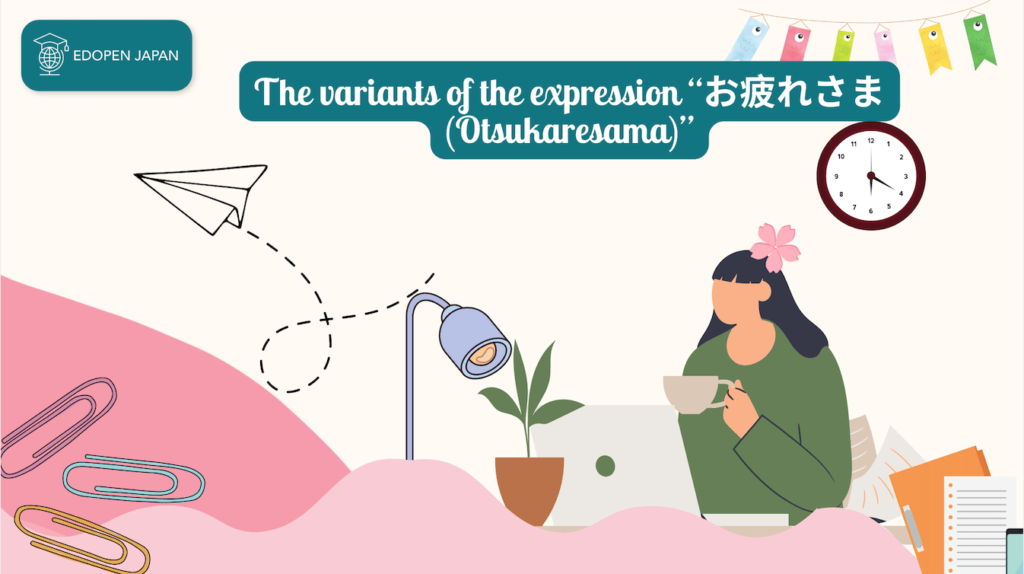
As is common in Japanese, words are shortened, sounds are abbreviated, or simply a word that is commonly used as a regional dialect is adopted into mainstream culture by younger generations. Below are some of the more common alternatives for Otsukaresama.
おつかれー Otsukaree
It is the same word just without any honorific together with it, it is used in any case and by everyone to normally friends or classmates whom they are comfortable with.
おつー Otsuu
This is mainly used by guys as an all-powerful greeting used at any time of the day when meeting or passing by each other. It doesn’t need to exactly be after class or work, as it can simply be a “yo” or “hey” in English. This phrase doesn’t convey any interest in forming a conversation after it so, it is common to be followed by another word that entails that feeling, such as おつー、あのさー “Otsuu, Ano saa…” That would be like, “hey, by the way…” in English.
乙 (Otsu)
It is an online text alternative for Otsukaresama/ Otsu greeting, it is chosen to be represented by this kanji as it can be pronounced the same as the start of -Otsu-karesama. It is normally used when someone dies in a game, just saying Otsukaresama to a friend after they did some work or homework or after something went so bad it is considered as if it finished already. This can also be a filler word to start any conversation online just sending an 乙― Otsuu is a way of starting a convo by yourself without an actual reason or before going to the main part of a conversation.
Other alternatives for Otsukaresama in Japanese
おつ↴ Ots
It is just the same just that the sound of the *su* gets shortened to just sound like Ots, it is used by any person just as a small greeting, after work, or as a passing-by greeting. It does not convey a start of a conversation.
おっつー Otttsuuu
This variation makes the sound of the *T* longer as if making a pause in between the word, when used this way it has a slight sense of “coolness” to it so it is mainly used by teenagers and young adults. This one also conveys to a certain point that there is something you want to say after it, so, in contrast with extending only the “u” sound at the end, it does entail the feeling of starting a conversation or getting closer to someone to talk.
Formal Alternatives of Otsukaresama
ご苦労様 Gokurou-sama
This one is, as explained above, considered a more formal alternative to Otsukaresama, but at the same time, it depends a lot on the generation gap between people to convey if it is formal or informal to use with them, and also it might be depending on your own age. For more information about Gokurou-sama reading the text above should give a better explanation of its use.
「遠いところご苦労様」
This phrase is used by itself as a formal and work-related greeting to convey gratitude to someone because they have come from somewhere far, it is true or not, it just conveys that the one receiving the greeting has needed to move from one place to another to be in front of you. It is mainly used by employees when a customer or a member of another company comes to their office. It might also be used as a general greeting at a meeting or an event where people from different places have physically come to meet at a designated spot.
The intonation of “お疲れさま (Otsukaresama)”
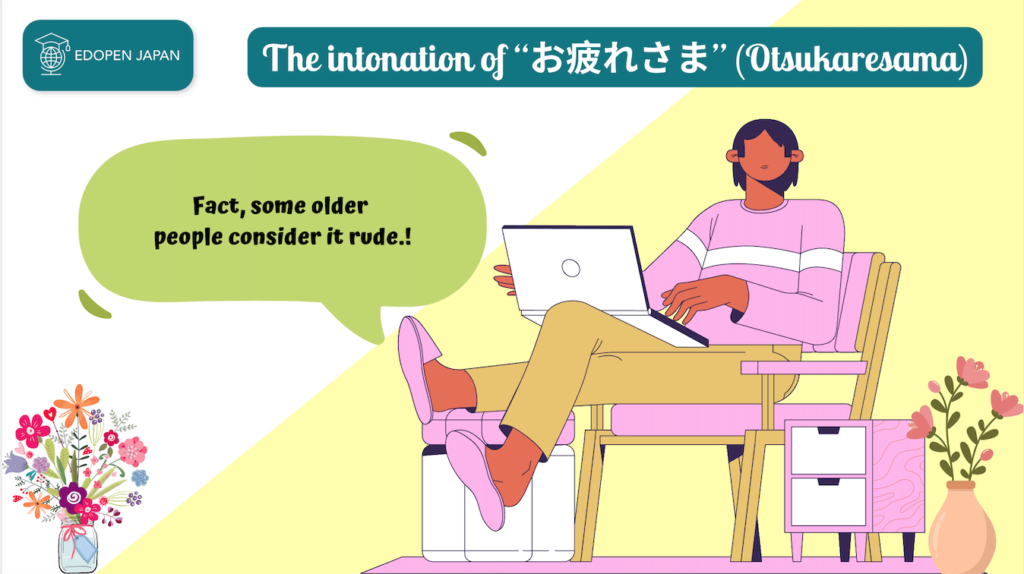
お疲れ様 Otsukare-sama is a word that is used so commonly in everyday life in Japan that just changing the intonation of its pronunciation can affect its meaning of it completely and more importantly the nuance for it, so below we will explain some of the different nuances that could be given to Otsukare-sama based on the different strengths or lengths when pronouncing it.
おつかれー Otsukaree
It is the most commonly used one, it is stoic and doesn’t convey anything besides closeness to the one on the receiving end, it might be used towards a friendly coworker or classmate.
おーつかれーOotsukaree
Has two extra elongations on the sounds of the normal pronunciation. Ootsukaree has a nuance of saying “bye-bye” to the ones staying behind. It might also have a certain mocking that the other people are staying behind and the one saying instead finished his part already and can go back earlier than others.
おつかれさーん Otsukaresaan
This is a way of wording Otsukaresama when they change the honorific from Sama to a less formal San. In this case, it becomes less formal in general, but by extending the sound of the *a* in San it gets to a point of a mocking feeling giving instead a guide of expressing that the one on the receiving end of this “greeting” didn’t work enough or that his work is not something so important nor hard.
Also, it could be “something that anyone could do without much effort”. So, it is because of this that it is considered a mocking expression. It is not normal to find this in everyday life, but it sometimes appears in Anime. It is common for the nuance to get lost in the interpretation.
Conclusion
In conclusion, お疲れ様 is a word that not only conveys the meaning of thanks for your hard work. That is what it translates into. In fact, it could easily be considered one of the most common greetings in Japan.
Also, because of the variety it presents, it can be used as a welcome or goodbye greeting. Also, depending on how its syllables are emphasized or lengthened. Therefore, we hope that you will be able to use it. More importantly, understand the nuances that come with this universal word.
Thank you for reading this article and お疲れ様です if you are interested in learning Japanese as well as Japanese culture. Our media is the best place for you. Please always update the latest information we have published here!


